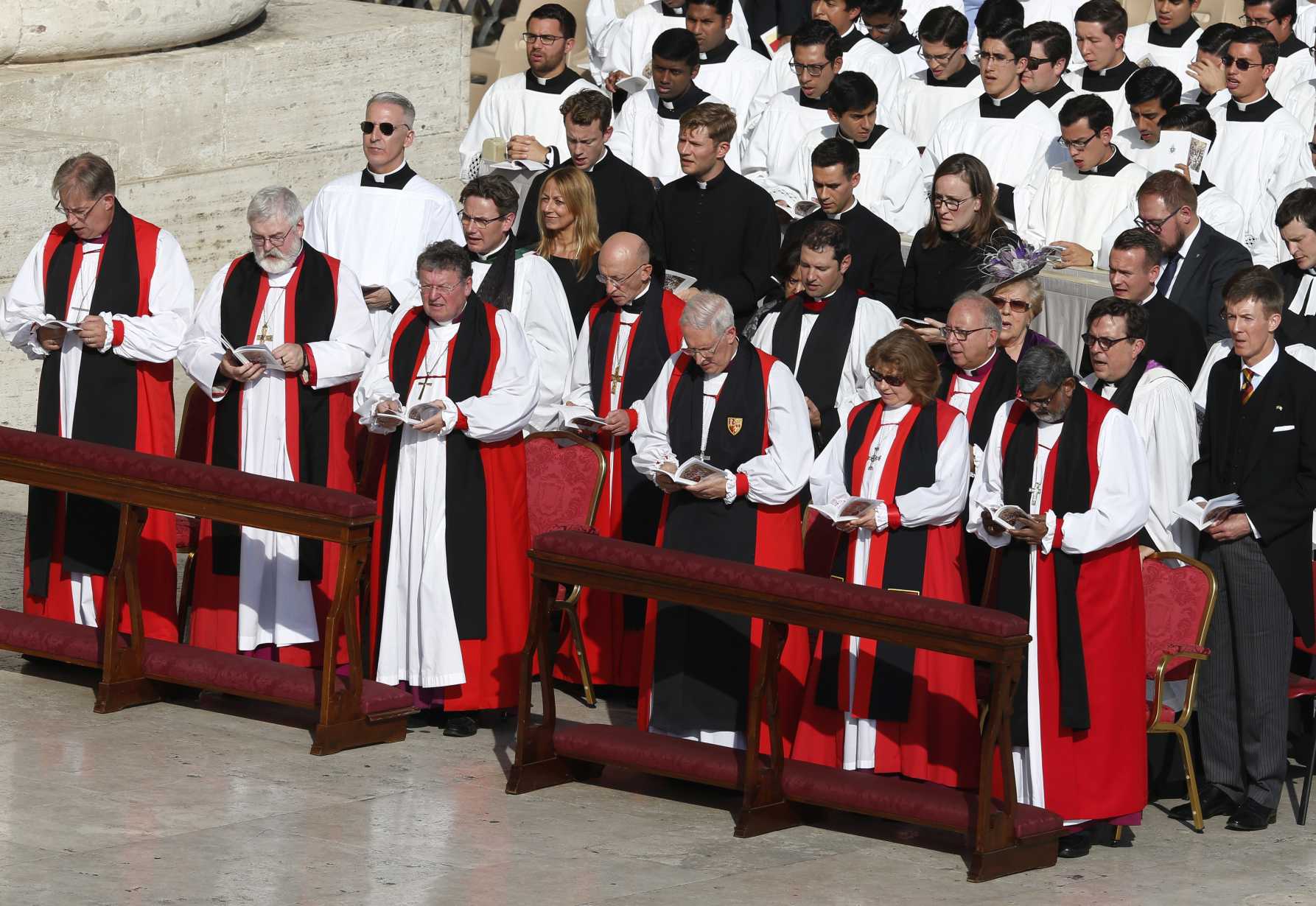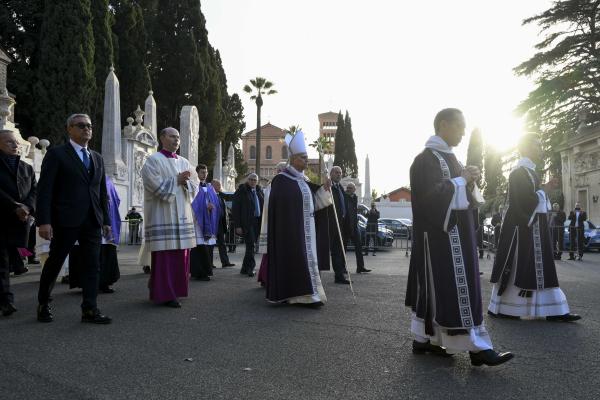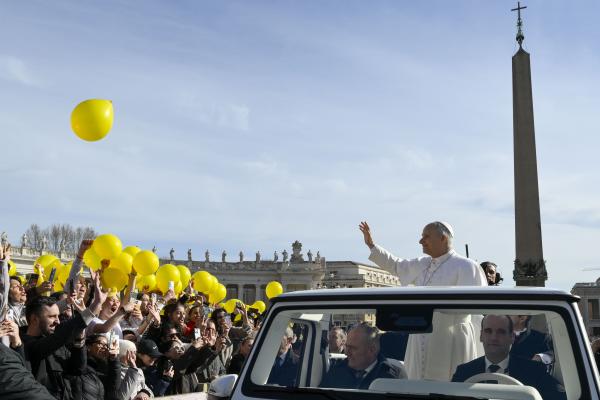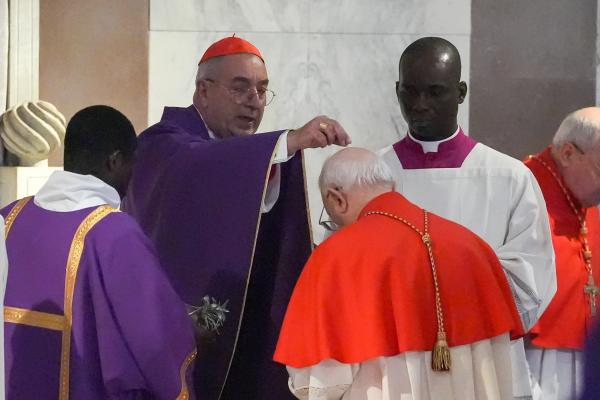Recognition of St. Newman is ecumenical celebration, leaders say
Pope Leo XIV will proclaim St. John Henry Newman a "doctor of the church" during a Mass Nov. 1. At the Jubilee of Catechists in September, the pope had said St. Newman "contributed decisively to the renewal of theology and to the understanding of the development of Christian doctrine" -- ideas grounded in his faith, which he initially came to as an Anglican.
 Cindy Wooden
Cindy Wooden

Anglican representatives attend the canonization Mass for St. John Henry Newman and four other new saints celebrated by Pope Francis in St. Peter's Square at the Vatican Oct. 13, 2019. (CNS photo/Paul Haring)
ROME (CNS) -- Pope Leo XIV's recognition of St. John Henry Newman as a "doctor of the church" will be an ecumenical celebration, a sign of esteem for the excellence and ongoing relevance of his teaching, first as an Anglican and then as a Roman Catholic, said a key figure in preparing the declaration.
Anglican Archbishop Stephen Cottrell of York, currently the ranking prelate of the Church of England, was scheduled to lead an Anglican delegation to the formal proclamation Nov. 1 by Pope Leo of St. Newman as a doctor of the church.
Father George Bowen, a priest of the London Oratory and postulator, or official promoter, of St. Newman being named a doctor of the church, spoke with journalists about the process and its implications Oct. 30.
Becoming only the 38th doctor of the church, Father Bowen said, "is not about being intelligent. It's not about being bright. It's about saying something timeless about the church's teaching, putting into words something eminent, something that stands out."
Father Bowen oversaw the compilation and submission to the Vatican of the 600-page "positio" or position paper outlining why St. Newman should be recognized as a doctor of the church. The process began almost immediately after St. Newman's canonization in 2019 and includes letters of support from bishops' conferences and individual bishops -- including many Anglicans, the priest said.
St. Newman was born in London Feb. 21, 1801, was ordained an Anglican priest, became Catholic in 1845, was made a cardinal in 1879 by Pope Leo XIII. He died in 1890.
"Newman's journey really began as a nominal Christian, baptized Christian who suddenly found faith in the Church of England through the influence of schoolteachers," Father Bowen said. "For all of his life, he was very conscious that half his life was spent in the Church of England. And this was something that was immensely important to him," and "he always recognized as a Catholic that he brought with him all that he had learned about Christ" as an Anglican.
"So, Newman is a big ecumenical figure in the sense that he owes his faith to his upbringing in the Church of England," the priest said. In fact, later in life, St. Newman republished the works he had written as an Anglican with new prefaces and some notes, "but basically saying, 'I'm proud of all this stuff.'"
Anglican Father William Lamb, vicar of the University Church of St. Mary the Virgin at Oxford, where St. Newman had served as vicar from 1828 to 1843, was at the Vatican for the saint's canonization and returned for the proclamation as doctor of the church.
"No one can stand at the altar or preach from the pulpit from which he preached and be unaware of his legacy," he told Catholic News Service Oct. 30.
"In recognizing St. John Henry Newman as a doctor of the universal church," Father Lamb said, "Pope Leo has made a significant and gracious ecumenical gesture in acknowledging the influence of this Anglican patrimony."
After the visit of Britain's King Charles III, which included prayer with the pope in the Sistine Chapel, the Anglican priest said, "I continue to pray for positive ecumenical relations and an ever-greater commitment to seek the gift of unity in a world which is so often fractured and estranged."
St. Newman and the "Oxford Movement" within Anglicanism "have shaped the life and spirituality of the University Church in many ways," Father Lamb said. "Every Sunday when we celebrate the Eucharist, we use a chalice that Newman gave to St. Mary's when he was the vicar."
But the saint's legacy also is broader and continues to impact the university, he said.
"Newman contributed to the reform of the tutorial system, one of the hallmarks of an Oxford education, when he was a tutor at Oriel College," Father Lamb said. "We celebrate not only his legacy as a theologian but also his contribution to the world of higher education. His 'Idea of a University' remains a key point of reference for the debate about both the value and the future of higher education."



